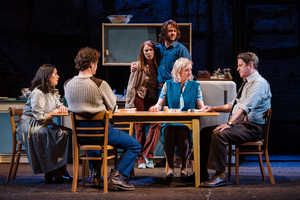Review: THE HOUSE OF SHADES, Almeida Theatre
Beth Steel's Blackburn Prize-shortlisted play is an aggressively enthralling but unsteady family drama.

![]() Same household, five decades. Starting from 1965, playwright Beth Steel accompanies the Websters as they live and die in a Britain that's not on their side. From Harold Wilson's Labour all the way across Thatcher's Tories to Brexit, the Websters see their Nottinghamshire home turn to ruins.
Same household, five decades. Starting from 1965, playwright Beth Steel accompanies the Websters as they live and die in a Britain that's not on their side. From Harold Wilson's Labour all the way across Thatcher's Tories to Brexit, the Websters see their Nottinghamshire home turn to ruins.
Shortlisted for The Susan Smith Blackburn Prize, The House of Shades is a haunting look at an East Midlands family who's framed and defined by their politics. Anne-Marie Duff leads a beyond-talented cast directed by Blanche McIntyre.
She is a complex, toxic, and hypocritical matriarch. Arrogant, ambitious, and resentful, her character Constance despises her upbringing and is an iron lady. Vain and prone to gossip, she is dismissive of the husband she only married to escape an abusive father and taunts him any chance she gets as she mourns her broken dreams of fame and fortune.
Her husband Alistair (Stuart McQuarrie), on the other hand, is a proud working-class man. Active in his local politics, he brings the political discourse to the dinner table along with library books for his children to feast on.
It's when his son Jack (Gus Barry as a teenager, Michael Grady-Hall as an adult, McQuarrie again in later years) announces he's become a communist over breakfast, that the story turns sour. Endless disputes push Jack away until he marries a young Tory who estranges him from his family. Big cars and money to flaunt change him for the worse, and what was a tight-knit house suddenly shatters.
While Jack got his ambition from his mother, his twin Agnes (Issie Riley early on, then Kelly Gough with a magnificent performance) got her working-class passion from her father. While he gets out and ultimately starts a small entrepreneurial empire, she stays back and watches her hometown get boarded up until her daughter Natalie ends up having to beg Jack to pay for her mother's funeral (he refuses).
Steel's political view might be dubious at a first glance as she tilts the light to uncover the ugly face of - as Jack calls it - progress. Beyond the fiery arguments, the strikes, and the men putting the world to rights over a pint, the family can't see a future that's suitable for everyone.
A botched late abortion carried out at home by Constance herself leaves the woman haunted for life. The death of her daughter Laura (Emma Shipp) carries consequences for her siblings too. Agnes blocked it out and mummy's boy Jack was unwittingly complicit in the disposal of the briefly squealing foetus.
Running at nearly three hours, the play meanders quite a bit with surplus material that might as well belong to something else. Steel attempts to keep the vibrant political discussion as the exoskeleton of the text, but the kitchen-sink drama is too aggressively enthralling to be contained by it.
The visual allegories slip into an oneiric vein here and there, conferring a romantic slant the working-class that feels at odds with the hyperrealistic subject. Alistair sees Aneurin Bevan right before he dies ("You made our dreams sound like common sense" says the feeble patriarch) and Constance glides into song and bats her eyes at the audience in her daydreams, all the while, their neighbour-slash-mortician-slash-moneylender acts as a lonely Greek chorus of sorts, commenting on the spiritual significance of their actions.
McIntyre double-casts a few of the roles, creating a fluid course of genetic echos and leanings as well as observable analogies. The six members of the family are reflected into the six supporting pillars in Anna Fleischle set design. A homely, warm kitchen is encased in iron beams that create a primitive concept drawing of a home.
At the back, frames hang on the Almeida's brick wall, giving the idea of boarded-up windows - an omen for what's to come. Through the years, these will intermittently receive Isaac Madge's video projections of a changing industrial landscape.
McIntyre struggles to maintain a steady pace with scenes that are either overly long or pass in a blink, which makes the end result feel sluggish. The text is topical and ambitious, but leaves a bitter taste in the mouth. Duff is a force of nature and the rest of the cast is equally strong, but the show is too unsteady.
The House of Shades runs at the Almeida Theatre until 18 June.
Photo credit: Helen Murray
Videos
